New cars
New Cars to Buy – Exciting!
Along with the new SUVs showcased last time, Australia will also see some other exciting vehicles arriving in the coming months. Keep your eyes out for the following:
Honda
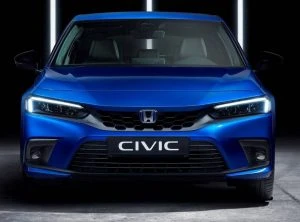
Civic Hybrid
Honda’s new Civic hybrid has its own subtle design features that set it apart from other Civic models. Hybrid-specific displays for the infotainment screen and instrument cluster gives the car its own environmentally friendly twist, plus the revised rear bumper is designed to conceal the exhaust outlets. Honda’s Civic Hybrid also gets blue accents for its Honda badges, and there is a special e:HEV tailgate badging to set it off nicely.
As a driver, the new Honda Civic Hybrid is an impressively competent vehicle with great economy and plenty of get up and go. The Civic HEV’s hybrid system is based around the 2.0-litre naturally-aspirated Atkinson-cycle petrol motor that is found in the current Honda Accord VTi-LX Hybrid. Matching the engine output to a smooth CVT automatic makes for an excellent easy car to drive. 315 Nm of torque provides grunt when you need it and the 135 kW of peak power suits this car well and delivers a bigger punch than the standard Civic’s 131 kW/240 Nm levels.
The front-wheel drive Honda Civic Hybrid is likely to be more efficient than the Accord Hybrid and even more so than Toyota’s Corolla Hybrid (4.2 litres/100 km).
BYD
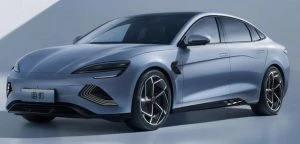
BYD Atto 4
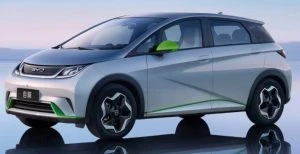
BYD EA 1 (Dolphin)
BYD Auto is the largest EV manufacturer in the world and is the automotive division of the Chinese multinational manufacturer BYD Company. Along with some SUV models, BYD is also bringing their Atto 4 sedan and their neat little EA 1 to Australia.
The BYD Atto 4 is a mid-size sedan that looks beautiful, sporty, and aerodynamic. Equipped with loads of the latest technology and also obtaining power from large batteries with a unique design, the Atto 4 impresses. Standard Atto 4 versions get a 61.4 kWh battery pack and a claimed 550 km range. The pricier models get a larger 82.5 kWh unique Blade battery with a claimed range of up to 700 km. Having the larger battery and an AWD system, this flagship BYD Atto 4 can reach 100km/h from a standstill in just 3.8 seconds!
More BYD excitement has the imminent arrival of the BYD EA 1 Hatchback. In China they call the BYD EA 1 the rather endearing name ‘BYD Dolphin’. This is a small Chinese EV hatchback that is being picked to be priced at or less than $30,000 in Australia. The small all-electric hatchback will be available with various battery and drivetrain configurations, all using a single electric motor to power the front wheels.
Two battery capacities: 30.7 kWh or 44.9 kWh will be available for the EA 1, both of which can be paired with a 70 kW/180 Nm motor. The larger 44.9 kWh battery can also be linked to a 130 kW/290 Nm motor, providing swifter acceleration and cruising speeds. Larger batteries will also become available over time for the little EA1 – particularly necessary, as Australia is a pretty vast land mass.
Managing director, Luke Todd, stated that “Our view is [that] in Australia any EV must have a minimum – even for city running – of 400 km to be accepted in the Australian market. All of our vehicles will have at least a 400 km range … our target is 500 km-plus.”
Cupra
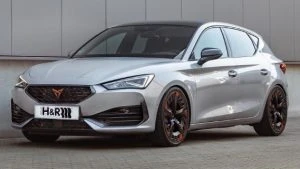
Cupra Leon
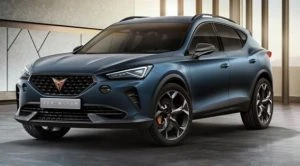
Cupra Formentor
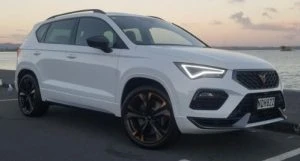
Cupra Ateca
Cupra is a Volkswagen-owned Spanish brand who have opened their doors to import their vehicles to Australia, offering us a 3-strong model range.
The exciting range of Cupra cars – Ateca (SUV), Leon (Hatchback), and Formentor (Crossover) – will spearhead the Australian line-up.
The Cupra Ateca SUV comes exclusively in the VZx form, so 221 kW of power and 400 Nm of torque is sent through the 4Drive AWD system to deliver 0-100 km/h in 4.9-seconds. I can see plenty of performance-SUV lovers who want to drive something as unique looking as the Cupra Ateca SUV wanting one!
The Cupra Leon Hatchback will be offered in VZ, VZe and VZx specification levels. So along with plenty of technology and differing variants, there will be a 2.0-litre turbo 140 kW/320 Nm, 180 kW/370 Nm, 180kW/400 Nm (Hybrid), and 221 kW/ 400Nm outputs respectively. So, there’s something for everyone here!
The Cupra Formentor is the Crossover Cupra and boasts the 4Drive AWD system on the V and VZx variants. Note the gorgeous crossover body styling that brings with it plenty of space, practicality and comfort.
All new Cupras sold in Australia will include a 5-year, unlimited kilometre warranty.
Volvo
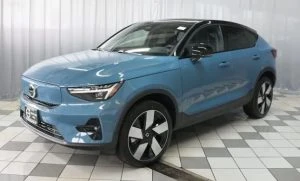
Volvo C40
Volvo has a new C40 coming! There are two versions offered that are based around one having a single electric motor and the other a dual electric motor layout. The Volvo C40 shares the electric powertrains with the XC40. Boot space is measured at 413 litres for both the single and dual motor versions.
Volvo’s the single motor C40 uses a 69 kWh battery pack and a single electric motor over the front axle. It produces 170 kW of power and 330 Nm of torque, combining nicely to provide drivers with a potential 0-100km/h dash being finished in 7.4 seconds. A full charge has a range of over 400 km.
Jump over to the Volvo C40 with its dual motor system, and you’ll find a larger 78 kWh battery pack. An electric motor for the front axle and an electric motor for the rear axle has this Volvo C40 equipped with AWD and capable of seeing off the 0-100km/h sprint in a claimed 4.7 seconds. That’s pretty swift! Again, a full charge should be able to take you over 400 km.
The single motor Volvo C40 kicks off at around $74,990, and the dual motor model around $82,490.
Audi
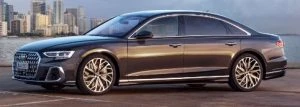
Audi A8
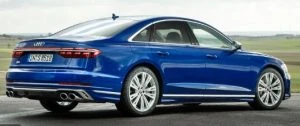
Audi S8
Audi’s A8 and S8 facelifts are coming. The A8 Sedan and Audi’s sportier S8 version have been a stunning proposition for some time, and they keep getting better. Quite an attractive large and luxurious sedan, the 2022 A8 delivers new levels of technology in the areas of comfort, entertainment, and safety.
The stunning A8 exterior remains similar to the outgoing model but you will find some nice subtle changes on the outside. 18–21-inch rims are available with six new designs to choose from. Audi’s ‘singleframe’ grille has been widened and pushed out at the bottom corners for a sportier, more athletic appearance.
The luxury sedan has grown a bit longer, making Audi’s flagship even more comfortable. It competes with the best big sedans from Mercedes Benz, BMW, and Lexus, so the relaxation seat package comes as no surprise, adding a back massage function, a foot warmer, an optional centre control console, and a fold-out table. 23 Bang and Olufsen speakers create an amazing audio sound.
Around the world, the new Audi A8 and A8 L versions will offer a wide selection of chiefly twin-turbo V6 engines that have 48-volt mild-hybrid assistance. All models will boast Quattro AWD and an 8-speed automatic. Audi S8 versions get the sweet-singing twin-turbo 4.0-litre V8 petrol ICE that can move this luxury–sports sedan from 0-100km/h in just 3.8 seconds. Boasting all-wheel steering, the S8 is a nimble thing of beauty.
Citroen
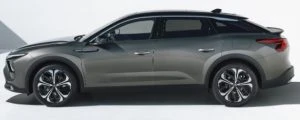
Citroen C5 X
Citroen calls the C5 X a “unique combination of the elegance of a sedan, the dynamism of a wagon and the elevated stance of an SUV”.
In my eyes, the new Citroen C5X looks both elegant and comfortable – just like a special Citroen should. The Citroen C5 X is a large 5-seater that measures 4805 mm in length. Luggage capacity is 485/1580 litres for the PHEV version and 545/1640 litres for the ICE car. Inside its cabin, you’ll find the C5 X is very comfortable, and the sensible interior layout is pleasant on the eye. A load of high-tech interior features include a digital driver’s display, a big 12.0-inch central touchscreen, Android Auto, Apple CarPlay, and a novel toggle gear shifter.
Adaptive dampers increase the Citroen C5 X’s ability out on the road, ensuring that those of us who love comfort can ride all day in a C5 X, all very comfortably indeed.
Equipped with the 165 kW/300 Nm 1.6-litre turbo-petrol four-cylinder ICE, the Australian version will have decent power (0-100 km/h in 8.8 seconds) while being hooked up to an 8-speed automatic transmission and FWD. A top speed of 232 km/h is doable. Citroen’s Australian importer is also considering launching the new Citroen C5 X with a PHEV powertrain. This system mates the 1.6-litre turbo ICE with an 81.2 kW electric motor and a 12.4 kWh lithium-ion battery for a total system output of 165 kW and a claimed electric range of 50 km (WLTP). The PHEV version is slightly quicker, boasting a 7.9 second time for the 0-100 km/h dash.
Peugeot
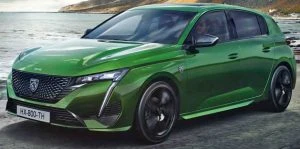
Peugeot 308
Peugeot is bringing us the next-generation 308 and the 3rd generation 308 is a classy looker from any angle you care to look at it from the curb side. Peugeot’s Australian line-up will consist of 4 variants: the 308 GT Hatch, 308 GT Premium Hatch and Wagon, and the Peugeot 308 GT Sport PHEV hatch – a plug-in hybrid (PHEV).
The PHEV versions of the 308 Hatch and Wagon will use larger batteries and more powerful motors than you’ll find in the smaller Peugeot e-208 supermini models. A Peugeot 308 GT Sport PHEV model sees a 132 kW 1.6-litre turbocharged 4-cylinder ICE unit paired to an 81 kW electric motor. The total output of the powertrain sends out a sprightly 165 kW of power and 360 Nm of torque to an AWD system for maximum traction and plenty of excitement.
New 308s with ICEs will be powered by a 1.2-litre turbocharged 3-cylinder petrol engine that produces 96 kW of power and 230 Nm of torque. This little engine is paired with an Aisin-sourced 8-speed automatic transmission that sends the power to the front wheels. Peugeot offers an e-308 in Europe, which is a pure electric variant.
Ford
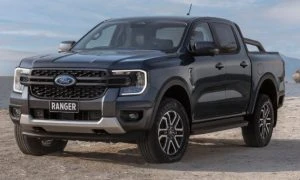
Ford Ranger Ute
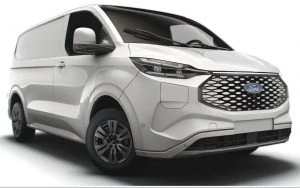
Ford E Transit
The new Ford Ranger Ute is packed with smart functionality and a cool ‘Tonka Toy’ appearance. Commands via voice, phone, or the central touchscreen has you controlling many of the infotainment features. Wireless phone charging, a smart climate control system, and a new digital cluster for the driver keeps the tough new Ford Ranger models at the head of the pack. Its chunkier styling with a wider stance, big towing capacity, and superior off-road ability are part of the new Ford Ranger experience.
Like the brand new Ford Everest SUV, the Ranger Ute houses the latest 3.0-litre turbo diesel V6 ICE, which is also offered alongside the existing 2.0-litre twin-turbo 4-cylinder diesel engine for 2022/23. The V6 boasts 184 kW of power at 3250 rpm and 600 Nm of torque from 1750-2250 rpm.
Ford’s latest E-Transit vans will be available with an all-electric powertrain for more efficient, zero-emissions driving.
Genesis
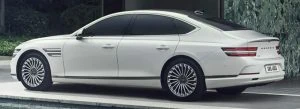
Genesis G80 Sedan
The charming Genesis G80 Sedan has gone pure EV and it is a stunner on the styling front. The car’s opulence and quiet ride will impress. An 87.2 kWh lithium-ion battery pack is housed under the floor, and a claimed Worldwide Harmonised Light Vehicle Test Procedure (WLTP) range of over 500 km is a decent amount of travel. The G80 EV Sedan has a pair of electric motors that work in unison to develop a maximum of 272 kW. This level of power combines with instantaneous torque of up to 700 Nm. These are powerful figures, allowing the luxurious Genesis Sedan to sprint from 0-100 km/h in less than 5 seconds.
Funky New SUVs To Buy
Here’s some new SUVs that have already arrived or will be arriving in Australia over the next little bit. Many of them are new Hybrid, PHEV or EV SUVs. There’s something for everyone, so keep your eyes out for the following:
SsangYong Torres

An exciting vehicle to arrive in Australia early 2023 will be the new SsangYong Torres. Those of us who like to find places off the beaten track will enjoy the Torres off-road capable models. A turbocharged petrol ICE will be mated to a 6-speed Aisin automatic transmission, and there will be FWD and AWD versions available.
Ssangyong will offer the Torres with 17-inch alloy wheels on lower grades through to 20-inch wheels on higher trims. Safety features include 8 airbags, adaptive cruise control, cross-traffic alert, autonomous emergency braking, blind-spot monitoring, and safe exit warning.
The new Torres is similar in size to a Mitsubishi Outlander. 703 litres of boot space is available when all 5 seats are up, or there’s a decent 1662 litres available when the second row is folded flat. A huge central 12.3-inch touchscreen rules the dash space, and drivers get a great looking digital display. Functions like the climate control and ventilation modes are found on an additional 8.0-inch touchscreen fitted below the prominent 12.3-inch screen.
Mazda CX-60

Mazda has another new SUV. Now that might sound as if I’m pulling your leg, with Mazda already providing a great line-up of SUVs across the board. However, the new CX-60 will be a luxury SUV competing directly against other big luxury names – like luxury SUVs from Audi and BMW. So, you should start getting the idea that the CX-60 is an SUV of a much higher standard than Mazda’s existing CX-5, CX-8 and CX-9 models.
The Mazda CX-60 will be comfortable and offer an impressive array of features and safety. With its 2.5-litre plug-in hybrid powertrain, the new Mazda CX-60 SUV will also offer the most powerful 4-cylinder engine Mazda has produced – the 241 kW of power and 500 Nm of torque is set to impress.
Suzuki S-Cross

Suzuki has their new small S-Cross SUV available for order. It is built in Hungary. The design is pleasant and practical, with plenty of comfort and space in its offering. Inside the latest S-Cross is a new 9.0-inch touchscreen display, and there’s a strong suite of driver-assistance features available as standard for all models – things like blind-spot monitoring, lane-keeping aids, adaptive cruise control, and AEB to name a few.
Under the bonnet you’ll find a turbocharged 1.4-litre petrol ICE. An ‘AllGrip’ AWD system means that you can get yourself out to some pretty remote places, and Australia hopefully will get the European version’s 48V mild-hybrid system –but we’ll wait and see on that one.
BYD Atto 3

No, BYD isn’t a new take on BYO (Bring Your Own). BYD stands for Build Your Dreams, and BYD Auto has delivered on the name because they are the largest EV manufacturer in the world. BYD Auto is the automotive division of the Chinese multinational manufacturer BYD Company. BYD has designed and developed many new ‘green’ products enjoyed by many around the globe – such as LED technology, solar farms, battery energy storage stations, and, of course, EVs.
The new BYD Atto 3 is an EV SUV. Pricing is very good, especially when you compare it with other EV SUVs – BYD now making an EV SUV much more affordable and accessible to the masses. The new BYD Atto 3 offers great EV SUV transport that, in normal everyday driving, will perform well, having a real world driving distance of between 350 and 400 km on a full charge. The quiet and comfortable electric progress makes for easy driving, and it’s pretty practical as well, with 434 litres available behind the back seats or 1330 litres when the back seats are folded flat. 0-100 km/h can be all over in a little more than 7 seconds.
Chery Omada 5

Chery is delivering the Chery Omada 5 Crossover SUV. Boasting peak output figures of 150 kW of power and 400 Nm of torque, and a 64 kWh battery that provides a WLTP-rated range of 450 km, these performance figures are stacking up nicely. The FWD Chery Omada 5 SUV also promises competitive pricing for an EV, plenty of practical space, and all the modern technology you’ll need for EV communications while at work and at play.
Genesis GV70 and GV60
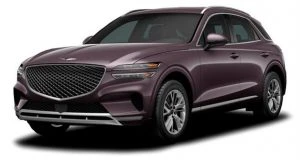
GV70

GV60
Genesis’s luxury GV70 is a pure electric SUV. The GV70 electric versions have been adapted to take a 77.4kWh lithium-ion battery pack and a pair of electric motors that combine to produce up to 360 kW of power and 700 Nm of torque. The resulting 0-100k/h sprint time is a cracking 4.2 seconds. Genesis quotes a WLTP range of 450 km-plus.
For something a little funkier, Genesis also brings us the new Genesis GV60. The GV60 shares its platform with the Kia EV6 and Hyundai Ioniq 5. You’ll also note that the interior of the Genesis GV60 appears familiar with an EV6 or Ioniq 5, but just a whole lot more luxurious.
Two models of the new Genesis GV60 are available: the standard GV60 AWD (234 kW), and the GV60 Performance (360 kW). The Performance variant of the GV60 raises the power output of both electric motors to 180 kW for the rear and 180 kW for the front. This results in a total output of 360 kW enabling the GV60 Performance AWD to accelerate from 0 to 100 km/h in 4.0 seconds (4.6sec without Boost Mode). A rear limited slip differential (E-LSD), black monobloc front brakes, and an adaptable electronic suspension that reads the road are part of the impressive GV60 Performance features.
Buy a standard Genesis GV60 AWD, and you get a 160 kW motor for the rear axle and a 74 kW motor for the front axle, totalling 234 kW for peak output and a maximum torque of 605 Nm.
Nissan
New Qashqai, X-Trail, and Pathfinder
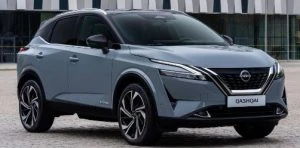
Qashqai
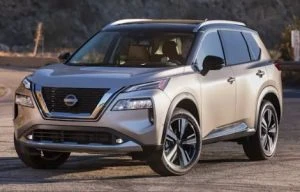
X-Trail
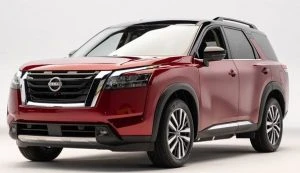
Pathfinder
More muscular, sharper in detail, and definitely a little suaver, the new Nissan Qashqai looks fantastic. With prominent shoulder lines, a new enlarged Nissan V-motion grille, and slim, full LED advanced matrix headlamps with boomerang signature daylight running lights, the Qashqai is impressive. Nissan certainly makes the Qashqai an attractive SUV for buyers wanting a capable and practical smaller SUV. With all the latest technology and luxury, the new Nissan Qashqai also offers its buyers an ePower powertrain in the full Qashqai line-up, meaning that the ePower system offers full electric driving where the wheels are completely driven by electric motors.
Nissan’s new X-Trail has similarly striking looks, new technology, and lots more to offer with its pleasant drive, comfort, and safety features.
Then there is the latest Nissan Pathfinder, delivering the ultimate family SUV 4×4 Crossover experience. The latest 9-speed automatic transmission delivers quick response and enhanced traction. With the all-new Intelligent 4×4 system a very capable one, you can select 1 of 7 available drive modes for on and off-road work.
Ford Everest

Ford claims the new big Ford Everest SUV has strong capability across all facets, especially when it comes to power, safety, and comfort. A very complete and likable SUV, the Everest is built tough, and yet delivers a nice and serene haven for its occupants on the inside. You can be sure that the 2022 Ford Everest is ready for everything your travels entail, including towing with a full load and the entire family.
Ford’s new Everest SUV has a strong on-road presence with a very horizontal fascia at the front that creates a rugged, tough look. The new grille with its distinctive C-Clamp LED headlamps showcases Ford’s tough design. Ambiente, Trend, Sport, and Platinum models are available for buyers.
The Everest houses the new 3.0-litre turbo diesel V6 motor, which is offered alongside the existing 2.0-litre twin-turbo 4-cylinder diesel engine. The V6 boasts 184 kW of power at 3250 rpm and 600 Nm of torque from 1750-2250 rpm. These two engines are also available in the new Ford Ranger ute, which is what this Everest SUV is built upon.
Alfa Romeo Tonale

Alfa Romeo’s Tonale is set to arrive early in 2023. As an entry-level model, the Tonale Super competes against Lexus, Mercedes Benz, BMW, Audi, and Volvo. The Tonale Ti is the top of the range model, easily rubbing shoulders with the best from out of these other luxury brands.
Plenty of the modern electronic technology is present, with 4G connectivity and voice-activated Amazon Alexa built into the new Tonale. It will be powered by a petrol–electric hybrid powertrain which is based around a new 1.5-litre turbocharged 4-cylinder ICE. Its pleasant Italian looks won’t go unnoticed.
BMW X1

One of the Tonale’s competitors will be BMW’s new X1 SUV. The X1 is a nice small SUV cruiser – larger than before though – and the exterior looks great, even a bit smarter than the outgoing models. Thus, with the increase in size, the luggage capacity has also grown from 505 to 550 litres and will expand to a maximum of 1600 litres when the 40/20/40 split-folding rear seats are folded flat. LED headlights and tail-lights are fitted as standard, with Matrix LED headlights available on higher trims.
Inside the new BMW X1 there is a re-designed and remodelled interior to enjoy. BMW also provide buyers with a fully-electric X1 – known as the BMW iX1. The third-generation BMW X1 covers all the bases with diesel, plug-in hybrid, petrol, and now electric variants being available for the global market. So far, petrol and electric models have been confirmed for the Australian market.
Buying a New Car with a Colour In Mind
We’re all different in many ways, and each of us has a list of favourite colours we draw upon in preference to others. That’s why when we redecorate our house, we’ll often choose the colours that suit our own tastes, or we’ll opt for a set of colours we like to dress ourselves in when it comes to buying and wearing clothes. While a car’s colour doesn’t actually affect its performance (“red cars go faster!”) or its handling, colour can certainly have a psychological effect on the car-buyer and the beholder.

Colours in the Rainbow
A car’s colour can also affect safety out on the road, and it might even affect the price of the car – in the case of second-hand vehicles, especially. And if you’re buying a new car, you often get a choice of colour, so it pays to be informed on car colour and why some colours are more popular than others!
Ready to buy a car? Research has shown that opting for a neutral colour like white, black, grey, and silver are your safest bets if you intend to sell the car to someone else later. In addition to the rising popularity of grey and silvery tones, other colours from greens to blues, reds and even violet colours currently seem to hit a chord with new car buyers.
However, if you want to expand your car colour palette, you may also appreciate learning that egg-yolk yellows, bright yellows, brown, bright orange, or even a vibrant purple colour for your new car could put you at a disadvantage when it comes time to selling or trading in for another vehicle. Naturally, these colours will appeal to a small niche of car buyers buying second-hand. Strike one of these limited buyers and I guess you could say it could also work in your favour. That said, younger drivers are making a move toward bright neon colours and bolder primary colours.
Some cars do look amazing, even quite spectacular in certain colours. Nevertheless, here is the list of car colours you should get the lowdown on, which will offer a heads-up before handing any money over and some handy hints and advice.

White: Here is the most popular car colour on the road. White is in the easy-to-care-for group and tends to look newer for longer, but white also tends to show mud and splashes easier than grey or silver. White is the safest colour for driving, thus making it one of the most common car colours we see out on the road. As our roads tend to be black or dark-grey, a white car stands out more readily and can be seen more easily by other road users. White cars are better noticed even during poor light conditions (e.g., during dusk or dawn). Still, because white is such a common car colour, white cars can be seen as a little bit bland and boring.

Black: A sleek black is always popular and looks amazing on almost any car. It is a prestige colour, being the colour of business suits and briefcases. Black is also a dark, sleek, and mysterious colour – think sunglasses, a black leather jacket, and boots. From an image perspective, black is sexy and savvy, and it is seen as being suave, a colour appealing to both the masculine and feminine. Black also makes a great canvas for a company logo.
From a safety perspective, black isn’t a terrific colour to be driving in because black cars are harder to see in conditions of poor light. Black also looks best when it’s fresh out of the car wash. Just give it a few minutes on a windy day and it will likely be covered with pollen, dirt, and dust all over again.

Silver and Grey: According to various studies, grey and silvery coloured cars are the easiest to clean, and they remain looking cleaner for longer. Dirt and dust can hide a little easier on grey surfaces, so your grey/silver car can look cleaner for longer. Silver looks a little brighter and shinier than your standard grey tones, adding a bit more class and elegance to the look in much the same way black can do. Silver, like black, might be worth considering then if you happen to regularly attend executive boardroom meets in the business world.

Red: Red is quite a popular car colour once you steer clear of the top three. Psychologists tell us that red is stimulating and alerting. Red cars are also cheerful and friendly, attracting the kids. Red is a flashy car colour and tends to hide mud easier than some of the other more vibrant colours. Nonetheless, red does become dull when dirty. Red colours are also more vulnerable to sunlight fade, requiring the need to head to the paint shop for a spruce up much sooner than many other colour types.

Blue: Blue is a colour on the rise and with the latest paint technology you can get all sport sorts of different shades from ocean blue to summer blue skies. Blue car colours are often associated with the environment and sustainability. There are many bright and bold blues that are quite eye-catching and attractive. This colour isn’t an easy colour to keep clean. Blues tend to show water spots easily. Scratches and swirl marks, and body bumps and bruises are more readily noticed on blue cars.

Brown: This colour is quite rarely seen on cars, as are golds and bronzes, however it is making a comeback in some of the more luxurious brands of car. Brown is a warm, eco-friendly colour that doesn’t show the dirt too badly. Browns are harder to see out on the road and are frowned upon from a safety perspective, but that’s where your DRLs come in handy!

Green: Green is also associated with the environment, so you would think that it would be the top choice for hybrids and bio-fuel vehicles. Oddly enough it isn’t particularly, unless of course you want to make more of a point about being a really green and sustainable person. Green colours come in two types: a) bright apple and lime tones, which tend to be associated with small, fun hatchbacks like a Toyota Yaris or b) dark greens, which are more sophisticated and often found on Jaguars, BMWs, and Audis. Green makes a reasonable canvas for a company logo and is often the choice for gardening contractors or conservationists.
From a safety perspective, the brighter shades of green tend to be quite eye-catching in daylight, mostly because it’s not a common colour out on the road. A darker green colour combines quite honourably with the dirt of an off-road 4×4. Generally, green coloured cars are easier to keep cleaner for longer than many other colours you can choose from. But green also shows paint and surface imperfections easier than grey, silver, and white cars do.

Orange: This lovely bright colour not only commands the beholder’s attention but it’s easy to clean. Orange isn’t always everybody’s cup of tea, so selling on might be harder than you might think. It tends to be good for road safety because there are only a few orange cars on the road, so they stand out.

Yellow: Yellow definitely stands out on highways. Yellows also easily hide dust and pollen. Nevertheless, yellows do emphasize mud splashes when you find yourself driving in wet and muddy conditions. Not everyone is a fan of yellow cars.

Purple: purple is another rarely seen colour. Violet and lavender purples tend to be associated with creativity and quirkiness, and the dark eggplant tones associated more with royalty. Purple cars are very noticeable and can look very striking, but this is also because they are rarer.

Pink: Traditionally, pink has been a colour that is considered to be sweet, soft, and feminine. Bright pinks tend to be rather visible – probably on a level with yellow from a safety perspective – but is also a rather fun colour for a car.
People who like to drive sports cars or who want to simply stand out from the crowd will be the car buyers who opt for a brighter, bolder colour – and why not!?
Fuel Miser Comparison (2010/2022) Smart-VW

I thought I’d look at a list of cars that featured in an article written back in 2010, where I compared some of the thriftiest cars at that time. These were cars which had been designed to function as some of the world’s best fuel sippers. These vehicles were sold new in Australia, but I thought I’d add a new twist this time by adding what we can consider as the brand new version of these old models with their statistics for fuel consumption as a comparison – you know, a bit of nostalgia along with the new, and what’s changed – or not.
Note that the fuel consumption figures are based on the number of litres of fuel consumed every 100 km travelled. Often real world situations can play havoc with Lab tested fuel consumption figures, but this definitely gives you an interesting picture And, here is the list that is in alphabetical order – just to be helpful:
Smart
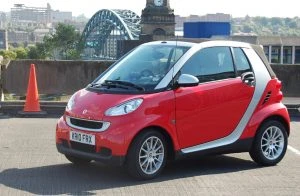
2010 Smart ForTwo
By far the smallest car being talked about in 2010 with excellent fuel consumption was the Smart ForTwo. It still fits into car parks like you wouldn’t believe! Small and safe, comfortable and peppy, any smart CBD commuter would be tempted by the tiny Smart ForTwo. It boasts a combined fuel economy figure that sits well under 5 litres/100 km – and this all coming from a ULP motor. Currently you can’t buy any new Smart car in Australia, though I’ve heard that, in the near future, they are making a comeback with purely electric power and with new design.
SsangYong
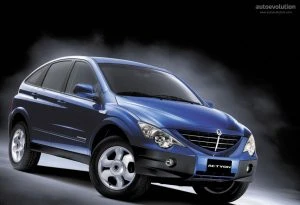
2010 SsangYong Actyon SUV
At the time, the 2010 SsangYong Actyon was about the most frugal SUV you could buy new at an impressively low price. The economic SUV has muscly looks and a rugged design that could see the vehicle handling tough off-road terrain with ease. SsangYong uses a 2.0 litre turbo-diesel engine in this vehicle, which packs over 300 Nm of torque to go with its excellent 4×4 underpinnings. Getting any 1.8 tonne vehicle to manage under 5 litres/100 km is a feat. So, well done to SsangYong! Currently, no more SsangYong vehicles quite match the excellent economy of an Actyon Diesel.
Suzuki
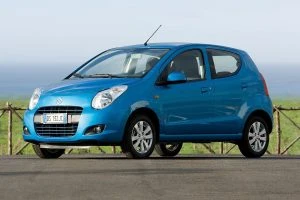
2010 Suzuki Alto
Budget priced, and one of the few petrol powered cars back in 2010 delivering awesome fuel economy was the Suzuki Alto. The Suzuki Alto 1.0 litre GL and GLX has an attainable fuel economy figure of 4.8 litres/100 km. The Suzuki Alto is also nice looking (bug-eyed), has six airbags, and even comes with ESP as standard in the GLX model. Great for around town – you’d be nuts to not consider an Alto.
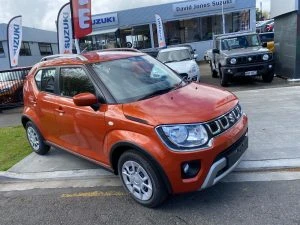
2022 Suzuki Ignis
There are no new Altos in 2022, but Suzuki do offer us the awesome little Suzuki Ignis GL Manual and GLX auto. These cars use a 1.2-litre ULP motor and deliver a similar fuel consumption to the 2010 Alto. Safety in new Suzuki cars has taken a big leap forward, so too has all the modern technology. Brand new Swift and Baleno models are definitely worth a look. These are also economy-driven cars with decent comfort, technology, and practicality.
Toyota
Where would the world be without Toyota? For a very frugal, spacious, and practical drive, the clean burning 2010 Toyota Prius III offered a 1.8 litre petrol hybrid engine. It didn’t come cheap, but it was certainly friendly on the environment. You could expect around 4.0 litres/ 100 km – sometimes better.
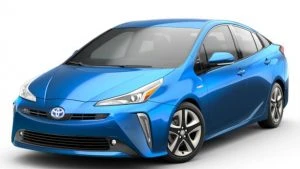
2022 Toyota Prius
You can now buy a 2022 Toyota Prius model for between $42–50k. These are nice cars and much more impressive to look at than the older models. They are safe and packed with excellent features. The Prius still continues with the same petrol-electric engineering that made it such a standout when it was launched in 2001. The same basic technology remains for the 4th-generation Prius, as well as all Toyota/Lexus hybrids these days. So, what a new Prius offers is a small-capacity 4-cylinder engine that works through a planetary gear set to dispense the delivery of power to the front wheels (or also the rear wheels in SUV variants). The current Toyota Prius is powered by a 72kW/142Nm 1.8-litre engine that combines with an electric motor to produce a joint maximum power output of 90kW and a claimed fuel consumption of 3.4 litres/100km. Better than ever! Toyota newest vehicles: the CH-R, Camry, Corolla, RAV-4, and Yaris Hybrid models are available with very low fuel consumption figures. Toyota and Honda are masters of the Hybrid-game, and have been for quite some time.
VW
Back in 2010, the Germans offered plenty of cars with excellent fuel consumption. Volkswagen has for a long time offered well-designed, reliable and fuel efficient motorcars. They are generally refined, elegant, and roomy, and the 2010 VW Golf 77TDI variant easily boasts fuel economy figures below 5 litres/100 km on a combined cycle.
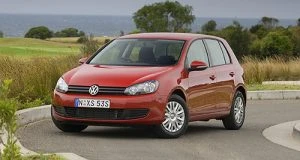
2010 VW 77TDI
2022 sees the Golf Hatch with 5 models, and in Wagon form it has a couple of nice new variants. The base models use a 110TSI 1.4-litre ULP motor, which is a 4-cylinder that is smooth and can return a claimed 5.8 litres/100 km. 250 Nm of torque offers muscle when you need it, and the car cruises at high speed effortlessly. The 8th-generation of the Golf brings not only fresh external and interior design, but it is also the safest, most tech-laden ever.
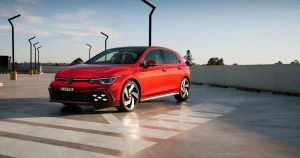
2022 VW Golf 110TSI
There are other new cars right across the auto-manufacturing spectrum now that offer superb fuel economy or EV power alone. It’s interesting how in that time (2010–2022) we’ve seen auto manufacturers taking a shift away from providing the new-car buyer with several frugal diesel family options to a fleet that is now a lot more Hybrid in flavour. It’s a change coerced by new government law and regulation. However, hybrid vehicles are superb automobiles that offer top fuel consumption figures and practicality, creating that much needed bridge between purely fossil fuel vehicles and completely EV-powered automobiles
Do check out the brand new arrivals. Cars like the Hyundai IONIC, Hyundai KONA, Kia EV6, Kia Niro, Mazda MX-30, BMW i and Hybrid models, Mercedes Benz EQA and EQC models, MG HS EV, Polestar cars, Tesla, and Volvo’s Recharge and Hybrid models are just some of the amazing new cars available that we can now buy that weren’t even a showing back in 2010.
Happy commuting!